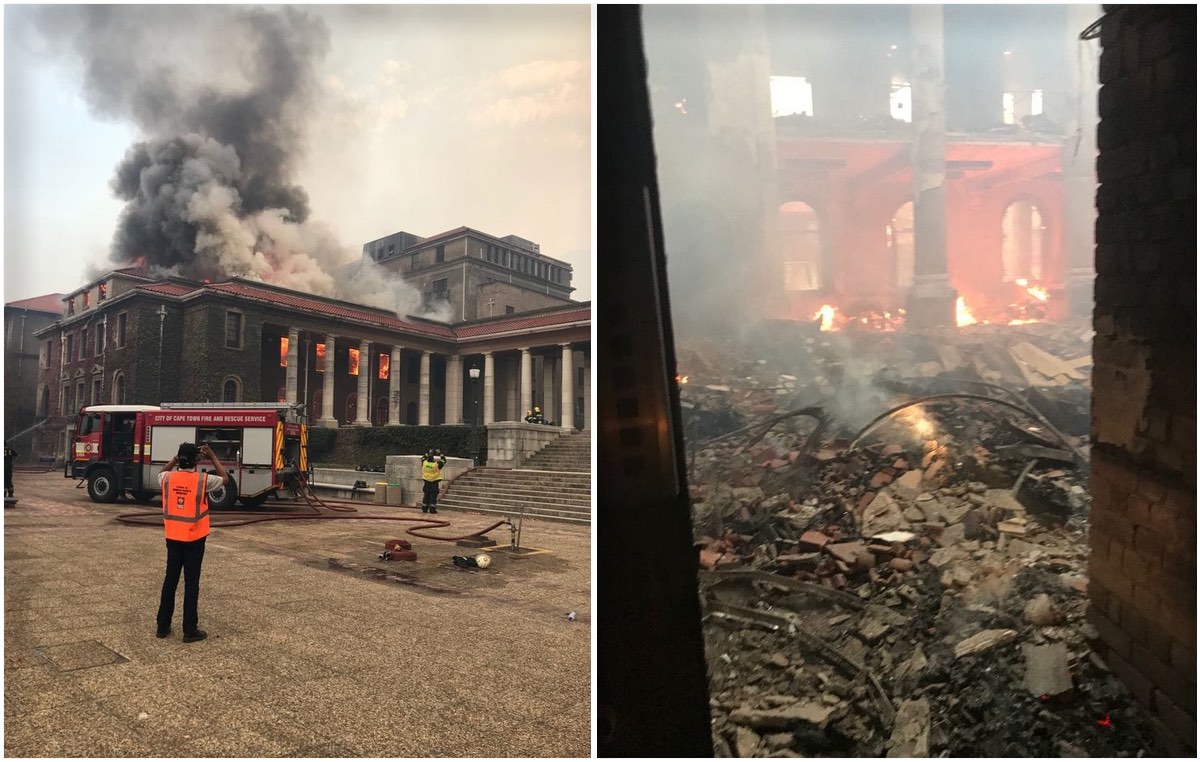Fire is a very powerful element, be it positively, or negatively so. The ‘discovery’ of fire, by man, has led to many great inventions over the years, whilst man’s inability to control fire, has also led to much destruction. Whenever fires burn, the first question that comes to mind is, “will we be able to extinguish it or will it overpower us?” Fires always bring death, in one way or the other and they also tend to refresh habitat zones and provide nutrients for new generations of growth.
Over the past few days, social and mainstream media was awash with images of a raging fire spreading across Table Mountain and leaving a trail of destruction behind it. Different opinions on the fire vibrated across different groups, with some quoting Zimbabwean nursery rhyme, Fire in the Mountain, bible verse Matthew 3:11 and others bemoaning the damage caused. Whilst the firefighters battled with the flames, the wind fanned them and we all watched with shock as buildings collapsed, artefacts were lost and people had to be evacuated from different parts of the city. Much of what was lost in this fire that raged on for a good 4 days, can never be recovered and whilst the ashes will be swept up and be disposed of, buildings refurbished and refurnished, archives have been lost forever.
Cape Town is a fire-prone city. Every other year, a number of people are displaced because of wild and uncontrollable fires across the city, which are either fanned by strong winds or encouraged by how shacks are stacked upon each other in townships and informal settlements. These fires rarely catch the attention of the world in the manner in which this current fire did nor do they receive the same response, locally and internationally. That can be attributed to the shock that reverberated across the world when news caught on that the fire had spread down the slopes of the mountain and reached the University of Cape Town (UCT). Only then, did it spring into people’s minds that fire can be destructive, that lives are sacred and certain things are irreplaceable. Even as the city and university work on a ‘build back better’ campaign, we all reel at the losses, more so of the artworks, recordings, papers and books that were housed in the Jagger Library on UCT Upper Campus.
The Jagger Library was a living and breathing museum and those who have had the luck of visiting it, would surely share the same sentiments. The university states that the roof of the Jagger Reading Room was gutted and the adjacent galleries, offices and store-rooms were razed to the ground, destroying a vast majority of archival and published print collections. It was home to one of the world’s largest and most valuable African Studies archives, housing books, papers, paintings, voice and video recordings and maps, some of which are over 500 years old. Amongst the archives housed in this library were old newspapers that had been started by black communities across the country, such as Imvo Zabantsundu, Ilanga Lase Natal, Izwi Labantu and Tsala ea Bečoana, better known as Tsala ea Batho. Whilst the university is still working out what exactly has been lost, it has been estimated that tens of thousands of valuable materials had perished. These are priceless archives that can never be replaced and whilst many ask themselves whether or not they had been digitized, one can never stress enough, the importance and feel of an original copy.
Some have questioned why people are so stressed by an archive that was essentially inaccessible to those who had no access to the university. However, with the type of history that we have as a country, those archives and many others are recorded histories which allow us to connect to the past. The African Studies Collection contained works that were recorded in multiple languages that cannot be found elsewhere in the world and was home to a host of literature that was banned throughout the apartheid era. Dr Shannon Morreira, states that “having access to this archive allowed for reflection on what histories and kinds of knowledge were valued in the past, and what was left out.” Access to this archive allowed current and future scholars the ability to be able to shape the research of the future whilst filling the gaps of the academic canon and resuscitating the importance of that which had been deemed unimportant before. Young scholars across the world should mourn the loss of such an important part of their history and so should everyone else.
The decolonial canon that is currently shaping up around the world, has lost an important source of knowledge and one can only hope that this disaster has sent a message to all universities across the world to speed up the digitization of their libraries. Physical archives should be protected at all times and even as we mourn this loss, we should remember the importance of research in shaping how things are seen. We should also take this as a lesson to make archives even more accessible to the public, to show people that there are no blank pages in history and to push for even more diverse sources of research in future. Whilst this fire has left a wound, it has also left grounds for us to build it in a better way and to ensure that we create an even more diverse archive that we can all be proud of.
The African Studies Library at University of Cape Town needs your help! Please spread the word about the university’s efforts to recover copies of archival materials after the devastating fire:
Sentence “Whilst this fire has left a wound, it has also left grounds for us to build it in a better way and to ensure that we create an even more diverse archive that we can all be proud of” updated.

